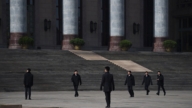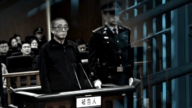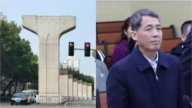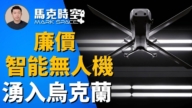【新唐人2014年01月27日讯】习近平最近又担任了中共最新设立的“国家安全委员会”主席,不久前,他还出任了“全面深化改革领导小组”组长职位。这对中国未来局势有何影响?请看学者的分析。
据中共官媒《新华社》报导,在1月24号召开的中央政治局会议上,习近平出任中央国家安全委员会主席,李克强、张德江任副主席。
“国安委”作为中共关于国家安全工作的决策和议事协调机构,向中央政治局、中央政治局常务委员会负责,统筹协调涉及国家安全的重大事项和重要工作。
至此,习近平集中共总书记、中国国家主席、中央军委主席、“国安委”主席及“深化改革领导小组”组长的权力于一身,完成了权力的全面垄断。
香港《开放》杂志编辑蔡咏梅:“现在国安委的最重要作用是让总书记集权,把权力高度集中在总书记手中。周永康的权利还加上了国防、外交这样的权利,集中起来,全部在习近平手中。”
香港《开放》杂志编辑蔡咏梅表示,中共“红二代”有更强烈的江山意识,习近平在太子党中有广泛的人脉,他结束了胡、温的“九个总统”时代。以前是党凌驾于国家之上,现在是习凌驾于党之上,达到了毛式个人独裁的权利体制。
蔡咏梅:“他一个人承担这个政权的时候,他把所有矛盾和危机也承担了。当他觉得维持不下去的时候,反而他一个人可以做出一个决定。”
蔡咏梅还指出,集权的习近平如果做不好,现在越演越烈的民间反抗怒火焦点,就会集中到他那里,就像中东推翻穆巴拉克和卡札菲独裁政权那样。所以,习近平在形势所逼之下,他有可能是罗马尼亚前领导人齐奥塞斯库的下场,也可能是台湾前总统蒋经国的结局。
时评作家、前《南都周刊》副总编长平指出,现代政治讲的是权力的分设与制衡。对世界上任何国家来说,如果一个人大权独揽可能都埋藏着一些危险,中国也不会例外,而且中国还有毛泽东的前车之鉴。
去年18届三中全会后,香港《苹果日报》披露,江泽民时代就有设立“国安委”的构想,曾在1997年提出相关方案,后来因为有反对的声音而流产。
旅美宪政学者王天成:“国安委它本身有对外对内的职能。那么这个对内来说,非常非常重要的就是加强对社会的控制,加强镇压。”
《德国之声》总结说,“国安委”涵盖了国内安全和国际安全,是一个为党政权安全而设立的。
德国之声引述美国《华尔街日报》的评论指出,“国安委”加强了国内安全机构的力量,更好的应对因污染、土地和腐败引发的中国民众抗议活动,及西藏和新疆等地的动荡状况。报导引述中国学者、国务院前秘书俞梅荪的话表示,现在中国国内社会问题严重,民怨沸腾,“国安委”的职责将针对老百姓,维稳将更厉害。
22号,中共发布了“全面深化改革领导小组”的领导层名单,习近平接管了李克强国务院的职责,出任组长。
旅美宪政学者王天成表示,“深改组”就是利用民众对中共还有一线改革希望而打的牌,目地是维护共产党的统治。
但王天成指出,习近平上台后,曾释放明确的信号,那就是“反宪政”。所以他不会进行政治改革。
王天成:“中国现在就是这么一个国家,到了最高层反而最腐败。那么最腐败的高层,它有什么动力去进行改革呢?它不愿意失去那些利益,它也害怕清算。”
而蔡咏梅指出,目前中国的财富全被权贵垄断,官民之间的对立越来越强烈。中共害怕中国革命,害怕底层阶级推翻统治阶级。他们推出深化改革就是想对民间做点让步,让特权收敛,平息民间的不满和愤怒。
采访/易如 编辑/宋风 后制/孙宁
Xi Jinping Named Head of National Security Commission: Return to One-Man Dictatorship?
Xi Jinping was recently announced as head of the
newly established National Security Commission.
Xi also chairs the leadership team for
“comprehensively deepening reforms”.
It appears that he has now grabbed all power at
hand inside the Chinese Communist Party (CCP).
Is this good or bad for China’s future?
Let’s look at the following report.
Xinhua News Agency reported about a conference of
the CCP Central Politburo, which was held on January 24.
Xi Jinping was announced to be heading the
new National Security Commission (NSC).
Li Keqiang and Zhang Dejiang became
Deputy Chiefs of this new commission.
The NSC is a decision-making, deliberation and
coordination organ on national security issues.
It serves the Central Politburo and
the Politburo Standing Committee.
Its role is in planning and coordinating
China’s major national security issues.
Xi Jinping also holds his appointments as President,
General Secretary, Chairman of the Central Military
Commission, Chairman of NSC and head of the
leadership team for comprehensively deepening reforms.
Each step has seem him continually manage
to monopolize all power in China by himself.
Cai Yongmei, Editor, Open Magazine: “The
most important function of this new NSC is to
centralize power onto the General Secretary.
Previously Zhou Yongkang had the
power on defense and diplomatic issues.
Now all power is centralized
and given to Xi Jinping.”
Cai Yongmei, Editor of Hong Kong’s
Open Magazine, commented further.
The party’s second-generation had a stronger sense
of protecting their power, by governing the state.
Xi has wide connections among CCP princelings.
He brought the “Nine Presidents” era
of Hu Jintao and Wen Jiabao to an end.
Previously, Party power ruled supreme over the state.
Now Xi’s individual power becomes supreme over the party.
He is establishing a personal
dictatorship similar to Mao’s era.
Cai Yongmei: “As he holds all the power in his hands, he
also carries all conflicts and risks on his own shoulders.
On the other side, if Xi feels that he can’t hold any
more, he can also make big decisions by himself.”
Cai Yongmei further commented that, if Xi doesn’t do
well with all the power at hand, he may face becoming the
target of increasingly intense revolts by the Chinese people.
This is looking like how Mubarak and
Gaddafi’s regimes were overturned.
Therefore, when the critical moment comes, the Xi regime
may end like those of former Romanian Communist leader
Ceaușescu, or former Taiwan president Chiang Ching-kuo.
Chang Ping, is a political commentator and former
Vice Editor-in-Chief of Southern Metropolis Weekly.
Chang highlighted the necessity in modern
politics for the separation of powers, and
the maintaining of balance between them.
In any country in the world, including China, personal
dictatorship results in hidden dangerous effects.
Furthermore, China has already learned this
lesson from disasters under Mao’s dictatorship.
Hong Kong’s Apple Daily released a report following
the Third Plenary Session of the 18th Central Committee.
It revealed that plans to establish the NSC
were in place when Jiang Zemin was in power.
The plan was presented in 1997, but
did not come to fruition due to opposition.
Wang Tiancheng, constitutional scholar: “The NSC
has control on both foreign and domestic policies.
Domestically, it’s most important task is to strengthen
control and suppression over Chinese society.”
Deutsche Welle commented that the NSC
covers both foreign and domestic security issues.
It is established to protect the party’s political power.
Deutsche Welle quoted an article by the Wall Street Journal.
It reported that the NSC strengthened power in national
security organs, to seek a better solution for citizens’
protests over pollution, land and corruption issues, as well
as social conflicts in places such as Tibet and Xinjiang.
According to the article, Yu Meisun, a former secretary
of the State Council said the CCP is now facing
serious social problems and seething public anger.
Therefore, the NSC will work to tighten the party’s
maintaining stability to suppress Chinese civilians.
On January 22, the CCP announced the leadership
team for comprehensively deepening reforms.
Xi Jinping took Li Keqiang’s place as the new head.
Constitutional scholar Wang Tiancheng said that
this group aims to extend the party’s governance
It exploits the only hope left among Chinese
people for some real reforms by the CCP.
However, Wang commented that after taking power,
Xi had released clear signals against Constitutionalism.
Therefore Wang does not believe
Xi will make any political reforms.
Wang Tiancheng: “The People’s Republic of China
is a country where higher officials are more corrupt.
If so, how can the most corrupt party
leaders be motivated to make reforms?
They fear being punished, but they don’t
want to give up their interests, either.”
Cai Yongmei said that currently, most of China’s
wealth is monopolized by high-level party officials.
The conflicts between the Chinese regime
and civilians are becoming more intense.
The CCP is afraid of revolutions,
or any attempts to overturn it.
It’s claims to deepen reforms is simply for easing public
anger, by making compromises and restraining privileges.
Interview/Yiru Edit/SongFeng Post-Production/SunNing






























